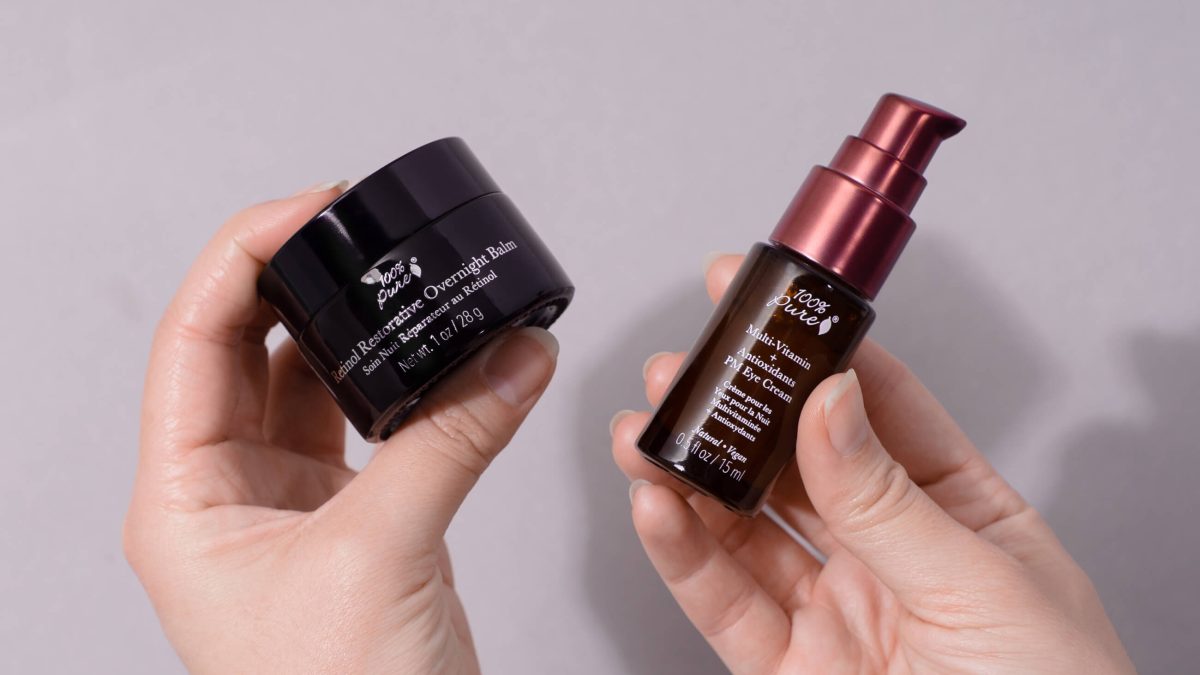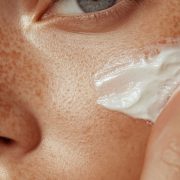Tips and Precautions for Using Retinol and Vitamin A
Posted on April 25, 2024 Written by: 100% PURE®

If we could dive into the Fountain of Youth, we imagine it would have many off-the-chart beauty benefits. But until we get our VIP access to that mythical fountain, we’ll thank our lucky stars for ingredients that offer youth-boosting benefits. Vitamin A is at the top of that gratitude list!
As with any great beauty accessory, there are a few precautions that come with the territory. We’re covering all you need to know on the benefits of vitamin A, who should – and should not – use vitamin A for skin, and how to safely use this vitamin for a radiant, more youthful looking complexion.
By now, you’re probably familiar with skincare’s A-lister, vitamin A – commonly employed as “retinol” in skin formulas. This all-star ingredient shows up everywhere, from acne creams to wrinkle fighters – but that doesn’t necessarily mean it’s right for everyone.
Touted as an anti-aging wonder, retinol is a derivative of antioxidant-rich vitamin A. It belongs to a family called retinoids, along with a bunch of other vitamin-A derivatives starting with the letter “R”, like retinyl palmitate.
According to , “Skin is a retinoid-responsive organ, able to readily absorb vitamin A when applied topically.” That suggests that using vitamin A derivatives in your beauty routine can have real benefits for your skin.
Using vitamin A for skin can help to unclog pores, counter free radical damage, stimulate collagen and elastin production, reduce the appearance of fine lines and wrinkles, and balance and tone the complexion for a more youthful, smoother complexion. Whew! In a nutshell, vitamin A encourages skin cell regeneration and cellular turnover.
You’ll recognize this ingredient as the star in our , , and . We’ll touch more on these anti-aging skin goodies below!

We know that vitamin A is extremely beneficial for a multitude of skin-loving reasons. As a veritable wonder ingredient, it’s suitable for many skin types to combat symptoms like acne and psoriasis. But as with the most our beauty products, there are effective ways to use vitamin A for skin and things to avoid.
Getting your beauty sleep is par for the course with retinoids, as they’re known to be more effective when used at night. Some are formulated with nourishing ingredients to help minimize potential skin irritation. However, adverse side effects, such as dryness, flaking, and peeling can still occur. This is especially true if you have sensitive skin or are a retinol rookie. So, you’ll need to start slow and exercise some caution.
Wearing vitamin A while you’re catching some Z’s is also when the wonder ingredient is safest. When exposed to sunlight, retinol can thin the skin’s protective barrier and cause photosensitivity, meaning burns and irritation. Sitting near windows or under artificial light also exposes skin to UV rays, so make it a rule to wear following any retinol application or treatment.

If you’re pregnant or breastfeeding, do not use retinol or vitamin A. While there’s been little research into its topical use and the amounts deemed safe when you’re expecting or nursing, it’s best to avoid using it altogether. If you’re looking to mitigate pregnancy acne or melasma, you should discuss alternative skincare options with your doctor.
When it comes to dietary supplementation early in pregnancy, it’s important to have vitamin A in your diet. There have been studies where it’s not only important for your baby’s growth, but also in delivery. The average American diet provides plenty of vitamin A; it’s available in meat, dairy, fish, eggs, and fortified cereals in the form of preformed vitamin A. It’s also in most fruits and vegetables, in the form of carotenoids like beta carotene (carrots, sweet potatoes) and lycopene (tomatoes, cabbage, papaya).
Getting an adequate amount of vitamin A during pregnancy is beneficial. But it’s very important not to get too much preformed vitamin A, which has been linked to birth defects and liver toxicity in high doses. Talk to your doctor about getting the right supplementation for your pregnancy!
These natural anti-aging products work together to address the stresses that environmental factors can impart onto your skin. Sun is the main culprit of dark spots, sagging, and fine lines. Some of the best things in life age your skin the most, but with the right care, you can manage your skin health and quality while still conquering your outdoor plans. Time to dive in!
We’ve included our fan favorite night serum to deal with discoloration caused by the sun and environmental factors over time. We love your freckles, but if you’re concerned about age spots or slight darkening, this is a great product to use in your nighttime skin routine. With its potent mix of vitamins and antioxidants, this serum has been praised by fans for reducing hyperpigmentation and post-inflammatory marks.
Instead of stripping formulas that literally bleach your skin, our version is comprised of rose water, plant-based retinol, vitamin C, and niacinamide, along with a stellar blend of nourishing oils and vegetable extracts. This potent serum also helps lessen the appearance of lines and wrinkles, increases firmness and elasticity, and brightens and evens skin tone.
This best-selling eye cream is a testament to the brand’s innovative spirit, combining caffeine from coffee and green tea with vitamins E, K, and C to de-puff, brighten, and hydrate the delicate eye area. Clinical studies and a devoted fan base underscore its efficacy in revitalizing tired eyes.
A powerhouse of vitamins C, D3, E, Coenzyme Q10, and Retinol, this treatment targets the signs of aging around the eyes, promoting collagen production, reducing fine lines, and enhancing skin plumpness. It’s a nutrient-rich formula that mirrors the brand’s commitment to high-performing, natural skincare.
Using a targeted anti-aging product around the eyes is key to completing your age protective routine. The eye area is always exposed, meaning signs of aging may appear harsher in that specific area than other parts of your body. Deep wrinkles, sagging, and crepey skin are all telltale signs of environmental damage. In addition to wearing sunscreen (we’ll get to that later), you’ll need to reverse damage done to this delicate area with products that aren’t too harsh.
This potent eye cream is gentle enough to be used around your eyes, since it’s made in a base of balancing rose water, renewing vitamin E, and gently soothing chamomile butter. Vegan retinol, stem cells, and peptides encourage cellular turnover and plump up skin that’s become weathered and dull. This eye cream encourages cells to turn over more quickly, to diminish harsh signs of aging around your pretty peepers.
This luxurious night cream is another all-star player – it should be applied post-serum for a healthy glow. It’s comprised of nourishing ingredients that pack a punch of multi-vitamins, including vitamins A, C, B3, B5, D, and K2. The result is an ultra-rich, correcting moisturizer that deals with dryness and irritation that comes with age and years of environmental exposure.
This formula respects your skin’s natural barriers and pH balance, thanks to a base made up of glacial water infused with aloe vera and organic green tea – ingredients that neutralize harmful free radicals that are the root cause behind aging skin. It’s a hard-working treatment that will have you covered for your daily dose of nutrients.
For a more targeted punch of retinol, you can swap out the Multi-Vitamin cream for our highly concentrated overnight balm. With a higher percentage of retinol, this balm will work wonders for resurfacing rough and dull skin and hyperpigmentation to reveal softer, more youthful layers of skin. This overnight treatment is gentle enough for all skin types, but should not be used every night. We recommend using 2-3 times per week, alternating with your Multi-Vitamin cream or other nightly moisturizer.
A total pro-aging routine means paying a little extra attention to areas that have the most fragile and sensitive skin. Years spent outdoors will add up, and speed up aging in the process. So, it’s important to give a little TLC to delicate zones that are the most prone to sun spots and sagging. Your neck and decollate require sun protection, adequate cleansing, and hydration to stay healthy and tauter over time.
With these important points in mind, we’re diehard fans of our age-corrective neck cream! This formula is concentrated with hydrolyzed quinoa, which promotes elasticity for a firmer, more lifted neck. Retinol reduces the appearance of lines and wrinkles, niacinamide brightens and balances tone, and olive squalane and hyaluronic acid lock in hydration for smooth, supple skin.
We created a multi-vitamin facial oil treatment designed for targeted anti-aging benefits. Stabilized multi-vitamins – E, C, D3, retinol and CoQ10 – and potent antioxidants work to drastically lessen premature signs of aging. We’ve employed the best vitamins for skin to work through the overnight hours: overhauling dull, crepey, or uneven complexions
This is a more potent, concentrated vitamin C treatment with age-correcting and glow-enhancing vitamins and nutrient that aims to bring drastic improvements from the first application. It targets multiple areas: brightness, collagen production, elasticity, and even moisturization. The mask includes a variety of powerful ingredients like age-correcting Bakuchiol, CoQ10, and Vitamin E.
A potent blend of 11 medicinal mushrooms and quinoa peptides, this serum harnesses the power of nature to firm, hydrate, and rejuvenate the skin. The inclusion of mushrooms, rich in antioxidants and omega-3 fatty acids, supports collagen production and combats oxidative stress, unveiling a youthful, resilient complexion.
This moisturizer is packed with EGCG, the most abundant antioxidant found in green tea. EGCG comes with a range of . EGCG helps regulate sebum production too, which is why we highly recommend this moisturizer for oily skin and acne-prone skin. The EGCG in this moisturizer is a potent ingredient that’s still soothing enough for sensitive skin.
How Can Beginners Introduce Vitamin A into Their Skincare Routine?
It’s recommended to apply a thin layer of retinol to the face and avoid sensitive areas. Use a pea-sized amount. Start with every other day application for the first few weeks. Always finish up with a non-comedogenic, natural facial moisturizer. Retinol should always be applied at night.
To acclimate your skin to the retinol, start using it twice a week (every three days) in the evenings. If you aren’t experiencing any redness or flakiness the next day, you can bump it up to every other day—and then even every day if your skin can handle it. As you start using retinol and slowly increase how often you use it, you should monitor how dry and flaky your skin gets. That is often one of the side effects of retinol, especially in the first few weeks. As your skin acclimates to the treatment, you will notice the redness and flakiness decrease, which is a sign that you can increase the frequency of application if you so desire.
What Precautions Should Be Taken When Using Retinol for the First Time?
Start slowly! One of the most common mistakes people make when starting to use retinol is using it every single night. For many people, that’s far too often, especially as your skin adjusts. To acclimate your skin to the retinol, start using it twice a week (every three days) in the evenings.
How Does Vitamin A Impact Sensitive Skin, and How Can Sensitivity Be Managed?
Vitamin A products definitely make sensitive skin more photosensitive. The use of vitamin A derivatives is known to make skin more sensitive to sunlight — a side effect many users may not be aware of. Be sure to acclimate your skin to the retinol, start using it twice a week (every three days) in the evenings. If you notice any discomfort, use it less often until you can better adapt to it.
Can Vitamin A Products Be Used During the Day?
It’s best to use vitamin A products during the night, as vitamin A makes you more prone to sun sensitivities and photodamage.
How Long Does It Take to See Results from Using Vitamin A?
As a rule of thumb, give your products at least a month of consistent use to kick in before giving up on them (unless of course, you experience effects like irritation or burning, in which you should stop use immediately). This timeframe will allow you ample time to determine if you’re seeing any changes in your anti-aging concerns.
While we love vitamin A for skin and all things retinol, we love safe and healthy skin even more. Therefore, we can’t stress enough the importance of applying at least an SPF 30 while using vitamin A and retinoids before going outdoors! We have an amazing selection of that are as nourishing as they are effective for protecting your precious skin.
While the natural aging process is undoubtedly a cause of fine lines and wrinkles, we know other factors may hasten it. The good news is, these are factors we can control. Incorporating an anti-aging routine to sustain skin health and knowing how to safely use and incorporate it, while encouraging youthful vibrancy and radiance will have you tackling pro-aging – that is, aging like pro.




